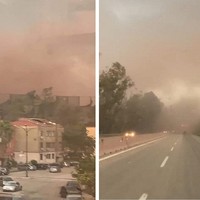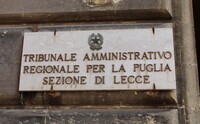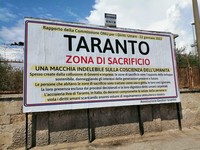The steel mill’s dust engulfs the city, but school windows need to stay open due to Covid-19
Based on a decree from the Apulian regional government (n. 1944 – 02/10/2012) which aims at curbing pollution from PM10 and benzo(a)pyrene, the Apulian Regional Agency for Environmental Protection (ARPA) has set up ‘Wind-days’ for the city of Taranto. These are days in which the wind blows from the Ilva steel mill – the largest in Europe - to its adjacent residential neighbourhoods, engulfing them with its dust and toxic compounds.

On these ‘Wind-days’ the local population is advised by the local public health authorities to minimise exposure to pollution by reducing outdoor activities in the morning and late evening. In addition to this, residents are asked to ventilate their homes only between 12pm and 6pm, when pollution levels are supposedly lower.
These public health recommendations translate into operational guidelines for schools and should be enforced by the mayor of Taranto. Schools are required to ventilate classrooms between 12pm and 6pm on ‘Wind-days’ to reduce concentrations of PM10. These guidelines nevertheless clash with more recent public health directions, which stress on the importance of continuous ventilation in classrooms to reduce risk of Covid-19 infection among pupils. The contradiction between these two different procedures create a public health dilemma which urges immediate action from the local and national authorities.
Taranto’s City Committee for Health and the Environment stresses that it is the mayor’s duty to push for the halting of the hot rolling mills of the factory in order to safeguard the public health of the residents. To curb the spread of Covid in classrooms, which now need steady ventilation, it is also necessary to interrupt all industrial activity that drastically increases the production of PM10.
Articoli correlati
 Quello che rivendichiamo con questo ricorso è il coraggio intellettuale della verità
Quello che rivendichiamo con questo ricorso è il coraggio intellettuale della veritàPrima udienza al TAR di Lecce sull'AIA dell'ILVA: confermata la plausibilità del ricorso
Hanno preferito rimanere in silenzio, senza intervenire in questo ricorso, i Comuni di Taranto e Statte, la Provincia di Taranto e la Regione Puglia. Soltanto il Codacons, con i suoi Avvocati, ha deciso di costituirsi appoggiando le nostre ragioni.28 January 2026 - Direttivo PeaceLink Il comunicato dell'associazione Genitori Tarantini
Il comunicato dell'associazione Genitori TarantiniAl TAR di Lecce la prima udienza contro l’AIA di Acciaierie d’Italia
Il prossimo 27 gennaio sarà celebrata la prima udienza relativa al ricorso contro l’Autorizzazione Integrata Ambientale (AIA) che consente di utilizzare il carbone per altri 12 anni nello stabilimento ILVA.24 January 2026 - Redazione PeaceLink I fondi resteranno a disposizione della causa fino all’ultimo grado di giudizio
I fondi resteranno a disposizione della causa fino all’ultimo grado di giudizioAggiornamento del ricorso al TAR della città contro l'AIA di Acciaierie d'Italia
Le somme raccolte ad oggi per sostenere il ricorso hanno raggiunto complessivamente i 31.840 euro. Le spese fino ad ora affrontate ammontano a 650 euro per il contributo di iscrizione al TAR di Lecce. In ragione di questa uscita, il totale ad oggi custodito è di 31.190 euro.22 January 2026 - Associazione PeaceLink Giustizia per Taranto: «Non è un salvataggio, è accanimento»
Giustizia per Taranto: «Non è un salvataggio, è accanimento»Diventa legge l’ennesimo decreto “salva-ILVA”
PeaceLink aveva già espresso un parere negativo alla Nona Commissione del Senato che aveva chiesto un intervento in merito al testo in esame. La discussione è poi passata alla Camera dei Deputati che ha approvato il trasferimento di 92 milioni e il prestito ponte da 149 milioni.21 January 2026 - Redazione PeaceLink
Sociale.network